Pilots working in some ports in Brazil have in some instances refused to board ships with faulty air conditioning system as the temperature in the crew cabins or on the bridge was too high.
This may result to significant delays, financial losses, and port state control inspections to ships, whilst penalties for non-compliance with requirements can go up to $300,000.
Marine insurer Gard said that they have refused to board vessels that do not maintain adequate working conditions, specifically concerning temperature control on the bridge and in pilot cabins.
The refusal is driven by local labour regulations, which mandate specific temperature ranges for the safety and comfort of employees.
Vessels not complying with the regulations could face significant operational delays, financial losses, and potential port state control inspections.
Gard advises managers and their seafarers to check that the vessel’s air conditioning is working properly prior to arriving in Brazil.
According to Gard’s correspondent, Proinde the Brazilian Regulatory Standards (NR), issued by the Ministry of Labour and Employment, are a set of regulations established by the Brazilian government to ensure health and safety in the workplace.
There are 36 Brazilian Regulatory Standards, Gard said, covering topics ranging from environmental risk prevention to safety practices for working at heights.
In general, the standards align with the main business activities in Brazil. NR 17 applies to cases such as those relating to thermal discomfort and issues with air conditioning.
Penalties for non-compliance with requirements are set out in NR-28. These can go up to USD 300,000, although insurer Gard said it is not aware of any cases where such high fines were imposed.
“The organization [employer] must adopt measures to control temperature, air speed and humidity in order to provide thermal comfort in work situations, observing the air temperature range parameter between 18 and 25 °C for air-conditioned environments whereas NR-19 establishes in free translation the requirements and prevention measures to guarantee the safety and health conditions of workers at all stages of the manufacture, handling, storage and transportation of explosives,” Gard said citing the section 17.8.4.2 of NR17.
Source: Gard



